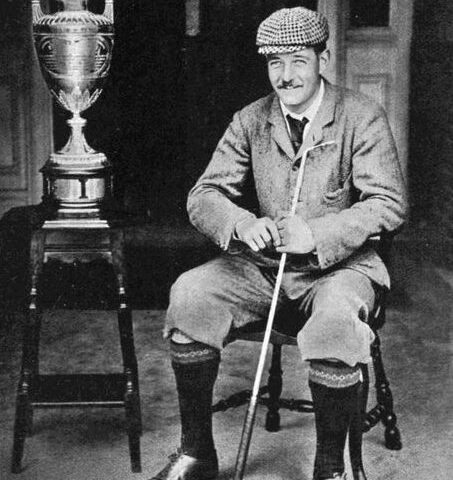Frederick Guthrie Tait (11 January 1870 – 7 February 1900) was an amateur golfer and Scottish soldier. He won the Amateur Championship twice, in 1896 and again in 1898, by convincing margins. Over his short golf career, Tait recorded at least 28 tournament victories. He tied for third place in the Open Championship in both 1896 and 1897.
Born at 17 Drummond Place[1] in the Second New Town in Edinburgh, Tait was the third son of eminent physicist and fanatical amateur golfer Peter Guthrie Tait.
The young Tait was educated at the Edinburgh Academy and Sedbergh School. He was admitted to the Royal Military College, Sandhurst, at his second attempt, and is credited with introducing golf there. Tait was commissioned a second lieutenant in the 2nd battalion the Leinster Regiment in 1890, and then transferred as a lieutenant to the 2nd battalion, the Black Watch, in 1894.
He learned golf at an early age and was already swinging golf clubs as a 5-year-old child. As an adult, Tait was an extremely powerful and long hitter of the ball. At The Royal and Ancient Golf Club of St Andrews on 11 January 1893, he hit the ball 250 yards, the ball then rolling on frozen ground and coming to rest 341 yards from the tee.
250 yards was the exact driving distance predicted possible through a careful application of backspin by Tait’s father in a paper of 1891, significantly further than the 180 yards achieved at that time.[2] Tait won The Amateur Championship twice (1896 and 1898), finished third in The Open Championship twice (1896 and 1897) and was leading amateur in the same competition on three occasions.
Death and Legacy
Tait was killed in action at Koodoosberg, South Africa, during the Second Boer War on 7 February 1900 and is buried there. A memorial plaque to his (and his father’s) memory stands on the inner north wall of St Johns Episcopal Church on Princes Street in Edinburgh. He is also remembered in the adjacent churchyard by a granite Celtic cross on the Tait family plot on the second burial terrace down from Princes Street. A memorial plaque from Dunalister Veterans Home is now rehoused in the Black Watch Museum in Perth.

